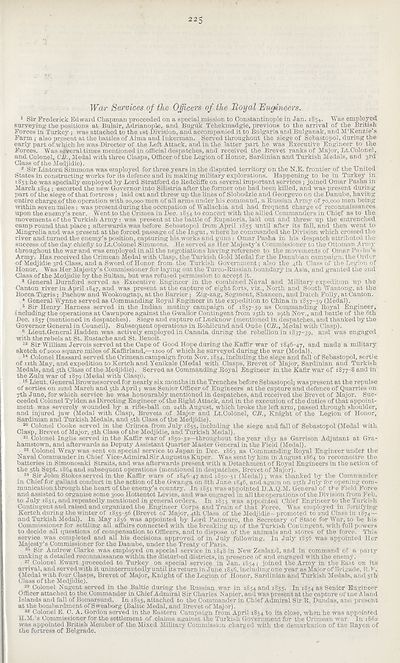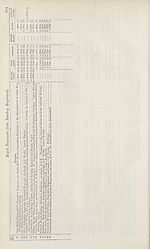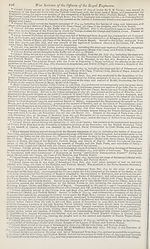Army lists > Hart's Army Lists > New annual army list, militia list, yeomanry cavalry list, and Indian civil service list > 1882
(193)
Download files
Complete book:
Individual page:
Thumbnail gallery: Grid view | List view

225
War Services of the Officers of the Hoyal Tjngineers.
' Sir Frederick Edward Chapman proceeded on a special mission to Constantinople in Jan. 185^. Was employed
surveying the positions at Bulair, Adrianople, and Buguk Tchekmadgie, previous to the arrival of the British
Forces in Turkey-; was attached to the ist Division, and accompanied it to Bulgaria and Bulganak, and il'Kenzie's
Farm; also present at the battles of Alma and Inkerman. Ser\'ed throughout the siege of Sebastopol, during the
early part of wliich he was Director of the Left Attack, and in the latter part he was Executive Engineer to the
Forces. Was seyeral times mentioned in ollicial despatches, and received the jirevet ranks of Major, Lt.Colonel,
and Colonel, Cl]., Medal with three Clasps, Officer of the Legion of Honor, Sardinian and Turkish Medals, and 3rd
Class of the Medjidie).
' Sir Lintorn Simmons was employed for three years in the disputed territory on the N.E. frontier of the United
States in constructing works for its defence and in making military explorations. Happening to be in Turkey in
185^ he was specially employed by Lord Stratford de Redcliffe on several important services; joined Omar Pasha in
March 1854 ; escorted the new Governor into Silistria after the former one had been killed, and was present during
part of the siege of that fortress ; laid out and threw up the lines of Slobodzie and Georgevo on the Danube, having
entire chargeof the operation with 20,000 men of all arms under his eomm.^nd, a Russian Arniy of 70,000 men being
within seven miles : was presentduring the occupation of Wallachia and had frequent charge of reconnaissances
upon the enemy's rear. Went to the Crimea in Dec. 1B54 to concert with the allied Commanders in Chiqf as to the
movements of the Turkish Army : was present at the battle of Eupatoria, laid out and threw up the entrenched
camp round that place ; afterwards was before Scbastopol from April 1853 until after its fall, and then went to
Mingrelia and was present at the forced passage of the Ingui, where he commanded the Division which crossed tlie
river and turned the enemy's position, capturing his works and guns : Omar Pasha in his despatch attri'oatcd the
success of the Any chiefly" to Lt.Colonel Simmons. He served as Her Majesty's Commissioner to the Ottoman Army
throughout the war and was erajjloyed in all the negotiations having reference to the movements of Omar Pasha's
Army. Has received the Crimean Medal with Clasj), tlie Turkish Gold Medal for the Danubian campaign, the Order
of Medjidie 3rd Class, and a Sword of Honor from the Turkish Government; also the 4th Cl.ass of the Legion of
Honor. Was Her Majesty's Commissioner for laying out the Turco-Russian boundary in Asia, and granted the 2ud
Class of the Medjidie by the Sultan, but was refused permission to accept it.
^ General Durnford served as Executive Engineer in the coiabined Naval and Military expedition vip the
Canton river in April 1847, and was present at the capture of eight forts, viz.. North and South Wantong, at the
Bocca Tigris; Pachow and Wookongtap, at the Barrier ; Zig-zag, Segment, Shaneen, and Dutch Folly, at Canton.
•* General Wynne served as Commanding Royal Engineer in the ex])edition to China in 1857-59 (Medal).
= Sir Henry Harness served in the Indian mutiny campaign of 1S57-59 'is Commanding Royal Engineer,
including the operations at Cawnpore against the Gwalior Contingent from 25th to 29th Nov., and battle of the 6th
Dec. 1857 (mentioned in despatches). Siege and capture of Lucknow (mentioned in despatches, and thanked by the
Governor General in Council). Subsequent operations in Rohilcund and Oudo [CB., Medal with Clasp).
*• Lieut.General Hadden was actively employed in Canada during the rebellion in 1837-39, ^'^'^ "^'^^ engaged
with the rebels at St. Eustache and St. Benoit.
" Sir William Jervois served at the Cape of Good Hope during the KafBr war of 1846-47, and made a military
sketch of 2000 square miles of Kafflrland,—1100 of which he survej'ed during the war (Medal).
'* Colonel Hassard served the Crimean campaign from Nov. 1854, including the siege and fall of Sebastopol, sortie
of nth May, and expedition to Kertch and Yenikale (Medal with Clasps, Brevet of Major, Sardinian and Turkish
Medals, and 5th Class of the Modjidie). Served as Commanding Royal Engineer in the Kaftr war of 1877-8 and in
the Zulu war of 1879 (Medal with Clasp).
'S Lieut. General Browne served for nearly six monthsin the Trenches before Sebastopol; was present at the repulse
of sorties on 22nd March and 5th April; was Senior Officer of Engineers at the capture and defence of Quarries on
7th June, for which service he was honourably mentioned in despatches, a,nd received the Brevet of Major. Suc¬
ceeded Colonel Tylden as Directing Engineer of the Right Attack, and in the execution of the duties of that appoint¬
ment was severely wounded by a rifle-ball on 24th August, which broke the left arm, passed through shoulder,
and injured jaw (Medal with Clasp, Brevets of Major and Lt.Colonel, CB., Knight of the Legion of Honor,
Sardinian and Turkish Medals, and 5th Class of the Medjidie).
'" Colonel Cooke served in the Crimea from July 1855, including the siege and fall of Sebastopol (Modal with
Clasp, Brevet of Major, 5th Class of the Medjidie, and Turkish Medal).
2' Colonel Inglis served in the Kaffir war of 1850-32—throughout the j'ear 1851 as Garrison Adjutant at Gra-
hamstown, and afterwards as Deputy Assistant Quarter Master General in the Field (Medal).
^^ Colonel Wray was sent on special service to Japan in Dec. 1863 as Commanding Royal Engineer under the
Naval Commander in Chief Vice-Admiral Sir Augustus Kuper. Was sent bj'him in August 1864 to reconnoitre the
batteries in Simonosaki Straits, and was afterwards present with a Detachment of Royal Engineers in the action of
the 5th Sept. 1864 and subsequent operations (mentioned in despatches. Brevet of Major).
2* Sir John Stokes served in the Kaffir wars of 1846-47 and 1850-51 (Medal); was thanked 1)3- the Commander
in Chief for gallant conduct in the action of the Gwanga on 8th June 1846, and again on 25th July for opening com¬
munication through the heart of the enemy's country. In 1851 was appointed D.A.Q.M. General of the Field Force
and assisted to organise some 3000 Hottentot Levies, and was enga.ged in all the operations of the Division from Feb.
to July 1851, and repeatedly mentioned in general orders. In 1855 was appointed Chief Engineer to the Turkish
Contingent and raised and organized the Engineer Corps and Train of that Force. Was employed in fortifying
Kertch during the winter of 1855-56 (Brevet of Major, 4th Class of the Medjidie—promoted to 2nd Class in 1874—
and Turkish Medal). In May 1856 was appointed bj' Lord Panmure, the Secretary of State for War, to be his
Commissioner for settling all alfairs connected with the breaking up of the Turkish Contingent, wuh full piiwers
to decide all questions of compensation to Otiicers, and to dispose of the animals and stores of the force. This
service was completed and all his decisions approved of in July following. In July 1856 was appointed Her
Majesty's Commissioner for the Danube, under the Treaty of Paris!
25 Sir Andrew Clarke was employed on special sei-vi'ce in 1848 in New Zealand, and in command of a party
making a detailed reconnaissance witliin the disturbed districts, in presence of and engaged with the enemy.
27 Colonel Ewart proceeded to Turkey on special service in Jan. 1854; joined the Arm.y in the Eas-t on its
arrival, and served with it uninterruptedly until its return in June 1856, including one year asMajorof Jh-igade, f!.V.
(Medal with four Clasps, Brevet of Major, Knight of the Legion of Honor, Sardinian and Turkish Medals, and 5th
Cla.ss of the Medjidie).
=3 Colonel Nugent served in the Baltic during the Russian war in 1854 and 1855. In 1854 as Senior Engineer
Officer attached to the Commander in Chief Admiral Sir Charles Napier, and was present at the capture of tne Aland
Islands and fall of Bomarsund. In 1855, attached to the Commander in Chief Admiral Sir R. Dmidas, anci present
at the bombardment of Sweaborg (Baltic Medal, and Brevet of Major).
32 Colonel E. C. A. Gordon served in the Kastcrn Campaign from April 1854 to its close, when he was appointed
H.M.'s Commissioner for the settlement of claims against the Turkish Government for the Crimean war. In 1862
was appointed British Member of the Mixed Military Commission charged with the demarkacioii of the Rayon of
the fortress of Belgrade.
War Services of the Officers of the Hoyal Tjngineers.
' Sir Frederick Edward Chapman proceeded on a special mission to Constantinople in Jan. 185^. Was employed
surveying the positions at Bulair, Adrianople, and Buguk Tchekmadgie, previous to the arrival of the British
Forces in Turkey-; was attached to the ist Division, and accompanied it to Bulgaria and Bulganak, and il'Kenzie's
Farm; also present at the battles of Alma and Inkerman. Ser\'ed throughout the siege of Sebastopol, during the
early part of wliich he was Director of the Left Attack, and in the latter part he was Executive Engineer to the
Forces. Was seyeral times mentioned in ollicial despatches, and received the jirevet ranks of Major, Lt.Colonel,
and Colonel, Cl]., Medal with three Clasps, Officer of the Legion of Honor, Sardinian and Turkish Medals, and 3rd
Class of the Medjidie).
' Sir Lintorn Simmons was employed for three years in the disputed territory on the N.E. frontier of the United
States in constructing works for its defence and in making military explorations. Happening to be in Turkey in
185^ he was specially employed by Lord Stratford de Redcliffe on several important services; joined Omar Pasha in
March 1854 ; escorted the new Governor into Silistria after the former one had been killed, and was present during
part of the siege of that fortress ; laid out and threw up the lines of Slobodzie and Georgevo on the Danube, having
entire chargeof the operation with 20,000 men of all arms under his eomm.^nd, a Russian Arniy of 70,000 men being
within seven miles : was presentduring the occupation of Wallachia and had frequent charge of reconnaissances
upon the enemy's rear. Went to the Crimea in Dec. 1B54 to concert with the allied Commanders in Chiqf as to the
movements of the Turkish Army : was present at the battle of Eupatoria, laid out and threw up the entrenched
camp round that place ; afterwards was before Scbastopol from April 1853 until after its fall, and then went to
Mingrelia and was present at the forced passage of the Ingui, where he commanded the Division which crossed tlie
river and turned the enemy's position, capturing his works and guns : Omar Pasha in his despatch attri'oatcd the
success of the Any chiefly" to Lt.Colonel Simmons. He served as Her Majesty's Commissioner to the Ottoman Army
throughout the war and was erajjloyed in all the negotiations having reference to the movements of Omar Pasha's
Army. Has received the Crimean Medal with Clasj), tlie Turkish Gold Medal for the Danubian campaign, the Order
of Medjidie 3rd Class, and a Sword of Honor from the Turkish Government; also the 4th Cl.ass of the Legion of
Honor. Was Her Majesty's Commissioner for laying out the Turco-Russian boundary in Asia, and granted the 2ud
Class of the Medjidie by the Sultan, but was refused permission to accept it.
^ General Durnford served as Executive Engineer in the coiabined Naval and Military expedition vip the
Canton river in April 1847, and was present at the capture of eight forts, viz.. North and South Wantong, at the
Bocca Tigris; Pachow and Wookongtap, at the Barrier ; Zig-zag, Segment, Shaneen, and Dutch Folly, at Canton.
•* General Wynne served as Commanding Royal Engineer in the ex])edition to China in 1857-59 (Medal).
= Sir Henry Harness served in the Indian mutiny campaign of 1S57-59 'is Commanding Royal Engineer,
including the operations at Cawnpore against the Gwalior Contingent from 25th to 29th Nov., and battle of the 6th
Dec. 1857 (mentioned in despatches). Siege and capture of Lucknow (mentioned in despatches, and thanked by the
Governor General in Council). Subsequent operations in Rohilcund and Oudo [CB., Medal with Clasp).
*• Lieut.General Hadden was actively employed in Canada during the rebellion in 1837-39, ^'^'^ "^'^^ engaged
with the rebels at St. Eustache and St. Benoit.
" Sir William Jervois served at the Cape of Good Hope during the KafBr war of 1846-47, and made a military
sketch of 2000 square miles of Kafflrland,—1100 of which he survej'ed during the war (Medal).
'* Colonel Hassard served the Crimean campaign from Nov. 1854, including the siege and fall of Sebastopol, sortie
of nth May, and expedition to Kertch and Yenikale (Medal with Clasps, Brevet of Major, Sardinian and Turkish
Medals, and 5th Class of the Modjidie). Served as Commanding Royal Engineer in the Kaftr war of 1877-8 and in
the Zulu war of 1879 (Medal with Clasp).
'S Lieut. General Browne served for nearly six monthsin the Trenches before Sebastopol; was present at the repulse
of sorties on 22nd March and 5th April; was Senior Officer of Engineers at the capture and defence of Quarries on
7th June, for which service he was honourably mentioned in despatches, a,nd received the Brevet of Major. Suc¬
ceeded Colonel Tylden as Directing Engineer of the Right Attack, and in the execution of the duties of that appoint¬
ment was severely wounded by a rifle-ball on 24th August, which broke the left arm, passed through shoulder,
and injured jaw (Medal with Clasp, Brevets of Major and Lt.Colonel, CB., Knight of the Legion of Honor,
Sardinian and Turkish Medals, and 5th Class of the Medjidie).
'" Colonel Cooke served in the Crimea from July 1855, including the siege and fall of Sebastopol (Modal with
Clasp, Brevet of Major, 5th Class of the Medjidie, and Turkish Medal).
2' Colonel Inglis served in the Kaffir war of 1850-32—throughout the j'ear 1851 as Garrison Adjutant at Gra-
hamstown, and afterwards as Deputy Assistant Quarter Master General in the Field (Medal).
^^ Colonel Wray was sent on special service to Japan in Dec. 1863 as Commanding Royal Engineer under the
Naval Commander in Chief Vice-Admiral Sir Augustus Kuper. Was sent bj'him in August 1864 to reconnoitre the
batteries in Simonosaki Straits, and was afterwards present with a Detachment of Royal Engineers in the action of
the 5th Sept. 1864 and subsequent operations (mentioned in despatches. Brevet of Major).
2* Sir John Stokes served in the Kaffir wars of 1846-47 and 1850-51 (Medal); was thanked 1)3- the Commander
in Chief for gallant conduct in the action of the Gwanga on 8th June 1846, and again on 25th July for opening com¬
munication through the heart of the enemy's country. In 1851 was appointed D.A.Q.M. General of the Field Force
and assisted to organise some 3000 Hottentot Levies, and was enga.ged in all the operations of the Division from Feb.
to July 1851, and repeatedly mentioned in general orders. In 1855 was appointed Chief Engineer to the Turkish
Contingent and raised and organized the Engineer Corps and Train of that Force. Was employed in fortifying
Kertch during the winter of 1855-56 (Brevet of Major, 4th Class of the Medjidie—promoted to 2nd Class in 1874—
and Turkish Medal). In May 1856 was appointed bj' Lord Panmure, the Secretary of State for War, to be his
Commissioner for settling all alfairs connected with the breaking up of the Turkish Contingent, wuh full piiwers
to decide all questions of compensation to Otiicers, and to dispose of the animals and stores of the force. This
service was completed and all his decisions approved of in July following. In July 1856 was appointed Her
Majesty's Commissioner for the Danube, under the Treaty of Paris!
25 Sir Andrew Clarke was employed on special sei-vi'ce in 1848 in New Zealand, and in command of a party
making a detailed reconnaissance witliin the disturbed districts, in presence of and engaged with the enemy.
27 Colonel Ewart proceeded to Turkey on special service in Jan. 1854; joined the Arm.y in the Eas-t on its
arrival, and served with it uninterruptedly until its return in June 1856, including one year asMajorof Jh-igade, f!.V.
(Medal with four Clasps, Brevet of Major, Knight of the Legion of Honor, Sardinian and Turkish Medals, and 5th
Cla.ss of the Medjidie).
=3 Colonel Nugent served in the Baltic during the Russian war in 1854 and 1855. In 1854 as Senior Engineer
Officer attached to the Commander in Chief Admiral Sir Charles Napier, and was present at the capture of tne Aland
Islands and fall of Bomarsund. In 1855, attached to the Commander in Chief Admiral Sir R. Dmidas, anci present
at the bombardment of Sweaborg (Baltic Medal, and Brevet of Major).
32 Colonel E. C. A. Gordon served in the Kastcrn Campaign from April 1854 to its close, when he was appointed
H.M.'s Commissioner for the settlement of claims against the Turkish Government for the Crimean war. In 1862
was appointed British Member of the Mixed Military Commission charged with the demarkacioii of the Rayon of
the fortress of Belgrade.
Set display mode to: Large image | Transcription
Images and transcriptions on this page, including medium image downloads, may be used under the Creative Commons Attribution 4.0 International Licence unless otherwise stated. ![]()
| British Military lists > Army lists > Hart's Army Lists > New annual army list, militia list, yeomanry cavalry list, and Indian civil service list > 1882 > (193) |
|---|
| Permanent URL | https://digital.nls.uk/103735362 |
|---|
| Attribution and copyright: |
|
|---|---|

